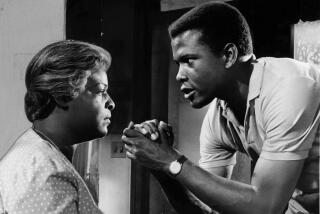PASSINGS
- Share via
Edward V. Hanrahan
Ex-Illinois prosecutor
Edward V. Hanrahan, 88, a former Cook County state’s attorney in Illinois whose political career was ruined when Chicago police assigned to his office killed two members of the Black Panther Party in 1969, died Tuesday, the Chicago Tribune reported. The cause and other circumstances of his death were not announced.
Hanrahan, a Democrat, was viewed as a potential successor to Chicago Mayor Richard J. Daley or a gubernatorial candidate before the December 1969 raid on the Black Panther headquarters on the city’s West Side. Ostensibly a search for illegal weapons, the raid by 14 officers under Hanrahan’s control left leader Fred Hampton and member Mark Clark dead. Both men were unarmed.
Hanrahan claimed that police had been fired on by members of the group during the raid, pointing to bullet holes in the door. It was subsequently determined that the “bullet holes” were actually nail heads.
The controversy resulted in Hanrahan’s defeat when he sought reelection in 1972. He ended up practicing law after leaving office. Over the years, he ran unsuccessfully for mayor, Congress and Chicago’s city council.
Born in Coconut Grove, Fla., Hanrahan moved to Chicago with his family when he was a boy. He graduated from Notre Dame and earned his law degree at Harvard. He served in the Army Signal Corps during World War II.
Huey Long
Jazz guitarist sang with Ink Spots
Huey Long, 105, a jazz guitarist whose sprawling career included stints with musical giants Dizzy Gillespie and Charlie Parker and as part of the famed Ink Spots vocal group, died Wednesday at a nursing home in Houston, according to his daughter, Anita Long.
Born in 1904, Long was first drawn to music as a teenager when a group of minstrels visited his hometown of Sealy, a small Texas town about 20 miles west of Houston. He began playing the banjo and joined the Frank Davis Louisiana Jazz Band in the mid-1920s.
In the 1930s, Long -- by then a guitarist -- went to Chicago, where he recorded with pianist Lil Armstrong and joined with Fletcher Henderson’s orchestra, who brought him to New York in 1943.
There, Long joined Earl “Fatha” Hines, whose big band included Gillespie, Parker and Sarah Vaughn. In 1945, Long was leading his own trio when vocalist Bill Kenny invited him to join the Ink Spots, whose velvet harmonies and flashy performing style had helped them become one of the first black groups to gain acceptance among white listeners.
Long harmonized on the classics “If I Didn’t Care” and “I’ll Get By” for the Ink Spots, who were inducted into the Rock and Roll Hall of Fame in 1989. The group is often credited with having a direct influence on the evolution of doo-wop groups and rhythm and blues.
After his stint with the Ink Spots, Long went on to form his own combo and studied music in California.
Thembi Ngubane
South African AIDS activist
Thembi Ngubane, 24, a South African AIDS activist whose radio diaries of her struggle against the virus won her audiences and admiration around the world, died Tuesday of drug-resistant tuberculosis in Cape Town, according to producer Joe Richman.
Ngubane carried a tape recorder with her for a year, and National Public Radio aired the diaries in 2006.
She went on to meet President Clinton and spoke at the opening of the international AIDS conference in Mexico City last year.
Her recordings can be heard at www.aidsdiary.org.
-- times staff and wire reports [email protected]
More to Read
Start your day right
Sign up for Essential California for the L.A. Times biggest news, features and recommendations in your inbox six days a week.
You may occasionally receive promotional content from the Los Angeles Times.






